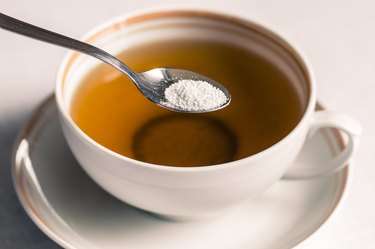
Aspartame is an artificial sweetener used as a substitute for real sugar in many processed foods and beverages, especially soft drinks. Despite its widespread use in the food industry, aspartame has been the subject of intense controversy surrounding its safety. According to the Food and Drug Administration, aspartame is safe for human consumption within the currently established nutritional guidelines, but questions concerning its effects on heart health and cardiovascular disease still exist. If you suffer from heart disease, consult your physician before using a product containing aspartame.
Pulmonary Hypertension
Video of the Day
A high intake of aspartame might increase your risk of developing pulmonary hypertension, or high blood pressure. High blood pressure resulting from aspartame use is caused by the vasoconstrictive effects of aspartame, or its ability to cause a narrowing of your blood vessels. Pulmonary hypertension might cause heart palpitations, shortness of breath, fatigue, chest pain and weakness, and might increase your risk of heart attack.
Video of the Day
Phenylalanine Effects
Phenylalanine is one of the amino acids that make up the aspartame compound. High amounts of phenylalanine might cause nerve damage in the brain, which can affect signaling transmissions from your brain to your heart, causing arrhythmia, or an irregular heart beat. An irregular heart beat is a serious medical condition that can increase your risk for heart disease and heart attack. A heart arrhythmia might cause palpitations, dizziness, fainting, weakness, and shortness of breath.
Obesity
As an artificial sweetener, aspartame provides no nutritional value in the form of calories. Some experts claim that this encourages overeating and ultimately might lead to an increase in obesity. Obesity, or excess body fat, increases cholesterol levels and places more strain on your heart and cardiovascular system. This stress might increase your risk of developing heart disease, such as hypertension and high cholesterol.
Other Considerations
In 2005, neurosurgeon Russell Blaylock identified aspartame as well as other artificial sweeteners as possible causes for sudden cardiac arrest in athletes. The aspartic acid in aspartame might cause excitotoxin damage to the sensitive tissues surrounding your heart. As a result, glutamic receptors throughout your body might become overstimulated, producing cardiac arrhythmias that could lead to sudden cardiac arrest and even death. However, more research needs to be done in this area to quantify the excitotoxic effect aspartame has on human tissue.
- Pub Med Health; Pulmonary Hypertension; 2010
- NaturalNews.com; Two New Studies on Aspartame and Diet Drinks Confirm Source of Obestiy, Cancer/Malignant Brain Tumor Epidemics; Mike Adams; 2005
- MedicalQuery.com; Athlete Alert: Renowned Neurosurgeon Identifies Aspartame & MSG in Sudden Cardiac Death; Russell L. Blaylock; 2005